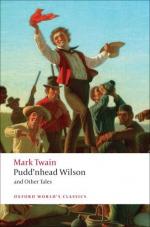|
This section contains 570 words (approx. 2 pages at 400 words per page) |

|
"The Gilded Age"
In Twain's lifetime, the America experienced astounding industrial progress and unprecedented social ills. Andrew Carnegie, Cornelius Vanderbilt, John D. Rockefeller, and other so-called "robber barons" made fortunes developing the American steel, railroad, and oil industries. While they strengthened America's industrial power and ushered the nation into the modern world, they grew their monopolies at the expense of smaller companies and the interests of ordinary workers by successfully influencing the President and Congress.
Although a few prospered enormously, average Americans paid a price for progress. America's agricultural economy gradually shifted toward industry, as unemployed farmers began migrating to the cities. The modern city emerged in this era, along with a host of urban ills: overcrowding, unsanitary living conditions that bred disease, and poverty. Most laborers worked at factories for low wages and usually in dangerous conditions. Unable to live on their parents' meager incomes, children also...
|
This section contains 570 words (approx. 2 pages at 400 words per page) |

|




